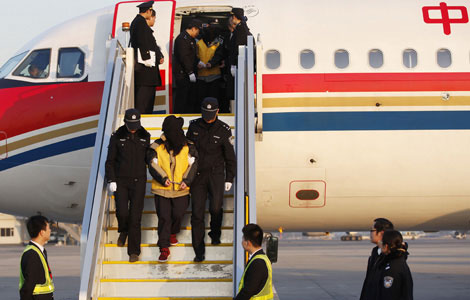Internet empowers China
Updated: 2013-09-26 02:11
By Gui Tao, Wang Ruoyao, Mao Pengfei (Consulate-General of the People's Republic of China in New York)
|
||||||||
In 1987, the first e-mail from China read: "Across the Great Wall we can reach every corner in the world". A quarter of a century later, the Internet is reshaping every corner of China.
POWERING THE ECONOMY
At the China Internet Conference in Beijing in August, visitors queued at the vending machines.
One young man wanting a bottle of water scanned a QR code with WeChat, a messaging app on his cell phone. At a beep, he punched in his bank ID number and the purchase was completed in seconds.
"It bridges online payment and offline consumption," he said, "When all the shopping malls provide this payment by scanning, I won’t need my wallet or even a credit card."
WeChat, owned by Chinese Internet giant Tencent, came into market two years ago. With 400 million users, it is pioneering new roads in China’s lucrative e-commerce market.
"Internet-related consumption of information products and services together with e-commerce are becoming the two biggest drivers of China's economic growth and restructuring," says Liang Chunxiao, vice president of the country's leading online trading platform company, Alibaba Group.
He predicts that online retail revenues will account for more than 16 percent of China's total social sales in 2020 when the total e-commerce value will exceed 28.8 trillion yuan (4.7 trillion U.S. dollars).
"E-commerce will boost related sectors such as logistics and raw materials, and help release the consumption potential in many remote areas," Liang says.
China's Internet economy will account for 6.9 percent of its GDP in 2016, up from 5.5 percent in 2010, according to a research report by the Boston Consulting Group last year.
Guidelines from the State Council, China's Cabinet, released in August said Internet-related consumption of information products and services is expected to reach 2.4 trillion yuan (392 billion U.S. dollars) in 2015, rising by more than 30 percent a year.
China's Internet users reached 590 million in the first half of this year, and 80 percent use their smartphones to go online. More businesses are recognizing the online potential of China's huge consumer market.
Home appliance retailer Suning, footwear manufacturing Xtep and commercial real estate developer Insite Space, businesses that once seemed unlikely to make an impact on the digital world, all participated in the Internet Conference.
The impact of Internet industry has just begun, says GaoXinmin, vice president of the Internet Society of China. "It will be ubiquitous in a few years. It will revolutionize all industries, and catalyze China's economic rebalancing and industrial upgrade."
FIGHTING CORRUPTION
China's netizens have formed a powerful force that serves as an informal watchdog that digs, spots and exposes officials in their words, misconduct and suspicious behavior.
Their power as an anti-corruption force was demonstrated when Liu Tienan was removed from his post as Vice Minister of the National Development and Reform Commission in May and put under judicial investigation in August.
Many believe Liu's sacking was a result of efforts by Luo Changping, a deputy editor of Caijing magazine, to expose Liu's alleged wrongdoing on the Internet in December.
The 58-year-old official was one of a series of officials brought down by Internet whistleblowing. In November, Lei Zhengfu was dismissed as Party chief of the southwestern Chongqing City's Beibei District after independent investigative journalist Zhu Ruifeng revealed he was involved in a sex scandal.
The landmark downfall of Liu suggests the ruling party welcomes netizens to join the anti-corruption campaign in a rational, legal way and encourages them to report wrongdoing under their real names, says Zhou Shuzhen, a politics professor at Renmin University of China.
From April 19, major news and commercial portals provided links on their homepages to official tip-off websites of the CPC Central Commission for Discipline Inspection (CCDI) and the Party's organization department, as well as the Supreme People's Procuratorate, the Supreme People's Court and the Ministry of Land and Resources.
Daily page views of the five websites more than tripled and the number of reports they received almost doubled, according to statistics issued by the State Internet Information Office.
Chinese people traditionally write complaint letters, pay petition visits or dial hotlines to report corruption and other misconduct by officials. However, the Internet has empowered them to fight corruption and to shine a light on official wrongdoing.
These exposures have triggered investigations by media and disciplinary authorities into possible corruption or other wrongful behavior by officials.
Liu Hongyi, deputy secretary of the National School of Administration branch of the Communist Party of China, says the public has always been concerned about corruption, and the Internet gives them a channel to release what they find.
"Easy access to public opinion has served as an additional pair of fists for the government to crack down on corruption, leaving corrupt officials nowhere to hide," says Liu.
"Like living in a fish tank, he or she is being watched all the time."
Most Viewed
Editor's Picks

|

|

|

|

|

|
Today's Top News
Li Tianyi jailed for 10 years for gang rape
China reduces intervention and facilitates business
Xi promotes 'mass line' campaign
UN resolution on Syria's chemical weapons urged
Youth short on safe sex awareness
Death toll rises to 328 in SW Pakistan's quake
Trending news across China
China gaining market share in military drones
US Weekly

|

|












